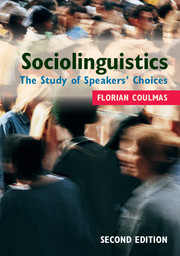Book contents
- Frontmatter
- Contents
- List of figures
- List of tables
- Preface to the second edition
- 1 Introduction: notions of language
- Part I Micro-choices
- Part II Macro-choices
- 7 Code-switching: linguistic choices across language boundaries
- 8 Diglossia and bilingualism: functional restrictions on language choice
- 9 Language spread, shift and maintenance: how groups choose their language
- 10 Language and identity: individual, social, national
- 11 Language planning: communication demands, public choice, utility
- 12 Select letters: a major divide
- 13 The language of choice
- 14 Research ethics
- Glossary of terms
- References
- Index
- References
10 - Language and identity: individual, social, national
Published online by Cambridge University Press: 05 August 2013
- Frontmatter
- Contents
- List of figures
- List of tables
- Preface to the second edition
- 1 Introduction: notions of language
- Part I Micro-choices
- Part II Macro-choices
- 7 Code-switching: linguistic choices across language boundaries
- 8 Diglossia and bilingualism: functional restrictions on language choice
- 9 Language spread, shift and maintenance: how groups choose their language
- 10 Language and identity: individual, social, national
- 11 Language planning: communication demands, public choice, utility
- 12 Select letters: a major divide
- 13 The language of choice
- 14 Research ethics
- Glossary of terms
- References
- Index
- References
Summary
At once, with contemptuous perversity, Mr Vladimir changed the language, and began to speak idiomatic English without the slightest trace of a foreign accent.
Joseph Conrad, The Secret AgentOne-dimensional social identities are not what they used to be…We all make choices about how seriously we take such identities, and many of us make choices about the identities themselves.
Walter Truett Anderson, Reality Isn’t What It Used to BeOutline of the chapter
Language serves instrumental and symbolic purposes. Among the latter, the manifestation of identity sticks out as a topic that has inspired a great deal of sociolinguistic research. Departing from the notion of ‘native speaker’, understood as the speaker of one’s proper, inborn language, this chapter investigates the link between language and identity. It discusses various kinds of identity – individual, ethnic, social and national – introducing major theoretical approaches to sociolinguistic identity research. On the basis of the Welsh language and its function for Welsh identity, the chapter argues that ethnolinguistic identity is variably emphasized by different speech communities, often playing a more important role for minority groups existing in the shadow of an overbearing neighbour than for speech communities whose language is not at risk of being replaced. It furthermore demonstrates that the language–identity link, rather than being an inalterable fixture, is historically contingent and can be either foregrounded or downplayed. The problem of shifting and multiple identities is discussed, and it is explained that identity research has moved from a predetermined concept to a more dynamic notion of identity as flexible and negotiable on both the group and individual level.
- Type
- Chapter
- Information
- SociolinguisticsThe Study of Speakers' Choices, pp. 189 - 202Publisher: Cambridge University PressPrint publication year: 2013

